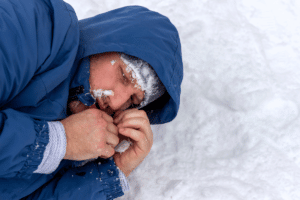According to the Occupational Health and Safety Administration (OSHA), one of the biggest risks that seamen face during work is hypothermia and frostbite. When a maritime worker falls overboard or is working in extreme weather conditions, hypothermia becomes a huge concern, and in many instances, it has led to the death of numerous seamen. Sadly, a multitude of these injuries and deaths could have been prevented had the workers been provided with safe working conditions and the proper safety training.

Hypothermia: The Basics
Hypothermia is defined as a severe drop in body temperature that can become extremely dangerous, and if not treated correctly, fatal. The word hypothermia is derived from two words: hypo, which means water, and thermo, which means temperature. The normal body temperature is 98.6 degrees Fahrenheit, and when temperatures drop lower than 95 degrees Fahrenheit, hypothermia follows.
There are three stages of hypothermia, consisting of mild, moderate, and profound. When the body’s temperature reaches under 89 degrees Fahrenheit, hypothermia is considered profound and death may follow
Symptoms of hypothermia include:
Mild (95-96.6 F)
- Goosebumps
- Shivering
- Shallow breathing
- Feeling dizzy and uncoordinated
Moderate (91-94.8 F)
- Blue and/or pale skin, especially around the lips, toes, fingers, and ears
- Stumbling and extreme coordination
- Uncontrollable muscle movement
- Confusions
Profound (Under 89.6 F)
- Dilated pupils
- Stiff limbs
- Unconsciousness
- Irregular heartbeat
- Mumbling and/or slurred speech
- Tachycardia
- Amnesia
- Incoherent and irrational
Cautions to Maritime Workers
Per OSHA, the weather doesn’t necessarily need to be extremely cold to cause hypothermia. Both land and water temperatures can be above freezing for hypothermia to occur. In fact, the water temperature can be just below the body’s normal temperature for hypothermia to strike. In addition, pre-existing health conditions, such as diabetes and hypertension can increase the risk of hypothermia.
All maritime workers should not only be educated regarding the risks of hypothermia and what to look out for, but should also take the following precautions:
- Take frequent breaks in warm shelter if working in cold weather
- Consume warm, high-calorie food and drinks, but avoid drinks with caffeine
- Wear protective gear such as an immersion suit and a loud whistle
- If several workers fall overboard, stick together in order to share warmth
- Try to get any part of your body out of the cold water, as air insulates much better than water.
Reasons for Hypothermia During Maritime Work
With the proper training and precautions, there is a better chance that seamen can avoid hypothermia. However, if left on an unseaworthy vessel that lacks the basic safety equipment and gear, the chances of hypothermia increase. In addition, navigating on rocky waters even when warned beforehand can cause workers to go overboard. Employers and vessel owners are responsible for the safety of crew members and workers while aboard, and must make every precaution to ensure that they are as safe as possible.
If you’ve experienced hypothermia or any other injury because of employer negligence, it’s important to understand your rights to medical treatment and compensation. For more information, see our articles Jones Act Lawyer and Maritime Rights and Compensation.